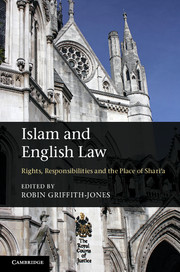Book contents
- Frontmatter
- Contents
- List of contributors
- List of abbreviations
- Preface
- Introduction
- Part I The Archbishop of Canterbury and shariʽa law
- Part II The Archbishop’s proposal for ‘transformative accommodation’
- Part III Responsibilities and rights
- Part IV Prospect: equality before God and before the law
- Select bibliography
- Index of cases
- Index
Part III - Responsibilities and rights
Published online by Cambridge University Press: 05 April 2013
- Frontmatter
- Contents
- List of contributors
- List of abbreviations
- Preface
- Introduction
- Part I The Archbishop of Canterbury and shariʽa law
- Part II The Archbishop’s proposal for ‘transformative accommodation’
- Part III Responsibilities and rights
- Part IV Prospect: equality before God and before the law
- Select bibliography
- Index of cases
- Index
Summary
Responsibilities and rights
The creation of avoidable resentment, never mind avoidable suffering, does not seem like a positive good for any social unit; and the assertion of an unlimited freedom to create such resentment does little to recommend ‘liberal’ values and tends rather to strengthen the suspicion that they are a poor basis for social morality and cohesion … We may decide, as on the whole we have decided, that religion should not be protected by law over and above the ways we have just been summarising; but that does not close the moral question of what are the appropriate canons for the public discussion of belief … Rather than assuming that it is therefore only a few designated kinds of extreme behaviour that are unacceptable and that everything else is fair game, the legal provision should keep before our eyes the general risks of debasing public controversy by thoughtless and (even if unintentionally) cruel styles of speaking and acting.
– From the Archbishop of Canterbury’s Lecture, ‘Religious hatred and religious offence’, in the House of Lords, 29 January 2008.The paradox is that from the Western perspective we frequently see the Muslim world as powerful, aggressive, coherent and threatening. From the other side of the world, the Muslim world – or a great deal of it – sees us as powerful, coherent and threatening in very much the same way. Now, when those are the perceptions, you don’t have a very fertile ground for critical, relaxed, long-term discussions of some legal and cultural issues.
– From the Questions and Answers following the Archbishop’s lecture, ‘Civil and religious law in England’, 7 February 2008.- Type
- Chapter
- Information
- Islam and English LawRights, Responsibilities and the Place of Shari'a, pp. 205 - 207Publisher: Cambridge University PressPrint publication year: 2013



